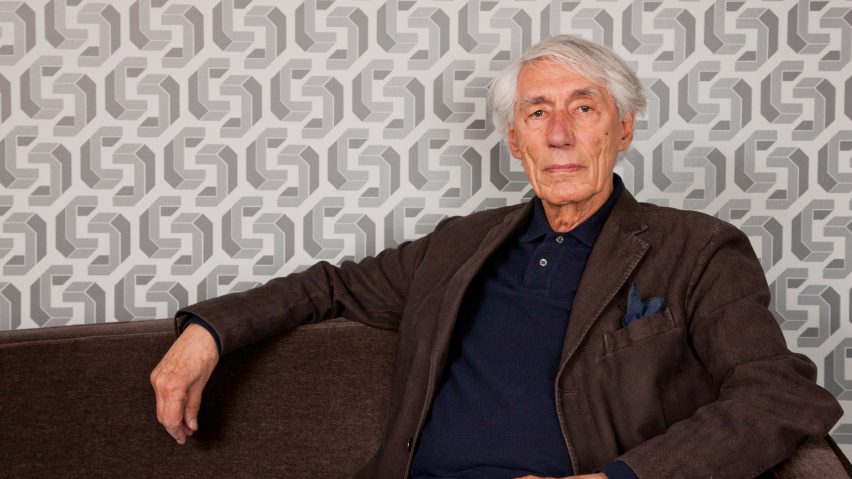Wim Crouwel, the renowned Dutch graphic designer responsible for the identity of Amsterdam's Stedelijk Museum for more than two decades and founder of Total Design, has died aged 90.
Dutch typographer and graphic designer Crouwel, nicknamed Mr Gridnik, died last week in his hometown of Amsterdam at the age of 90.
Tributes from around the world
Tributes have flooded in from around the world, with Crouwel telling Dezeen in a 2011 interview that he hoped he would be remembered as a "straightforward" designer.
"So sorry to hear that Wim Crouwel has died. His work reflected him so well: brave and witty, and perfectly composed," wrote New York type design studio Frere-Jones Type on Twitter.
Describing him as the "king of grid", online platform Typeroom said in a tribute that he was "one of the most prominent and important figures in the visual arts of our times" and "a lover of clarity, functionality and machine-like simplicity".
Dutch designer Richard Hutten described him on Instagram as "such an icon".
Founder of Thonik design studio and former chair and creative director of Design Academy Eindhoven, Thomas Widdershoven, paid tribute on Facebook: "A phone book changed my life. Wim Crouwel typeset the 1972 edition in lower case only. It was the first time I became aware of something called graphic design."
"A simple decision. A beautiful result. And so many social implication. It was a declaration for a new society. Thank you, Wim," Widdershoven's Facebook post continued.
Two decades at the Stedlijk Museum
Responsible for the graphic identity of the Stedelijk Museum between 1963 and 1985, Crouwel produced more than 400 posters for the museum and at least 300 catalogues, as well as all its visual communications.
An exhibition of his typographic work, called Wim Crouwel: Mr Gridnik, will open at the museum next week.
"Throughout his life, he is a fervent believer in taking a rational approach to the subject and believes neutrality is integral to the task of the designer," said the Stedelijk in a statement following his death. "He never avoids debate, but remains true to his principles."
"The Stedelijk Museum mourns the loss of an exceptionally gifted and extremely loyal friend and passionate ambassador for design," it continued.
Wim Crouwel spoke to Dezeen ahead of an exhibition at the Design Museum
Crouwel is also revered for his typography design, including the parametric New Alphabet typeface of 1967, and 1974's Gridnik, with characters based on grid squares with angled corners.
"I have always tried to be a no nonsense designer, straightforward, no baroque, no fantasies," Crouwel told Dezeen in an interview in 2011.
"Straightforward, readable and well structured typography. That's what I wanted to do and I hope that they will remember me as a designer who was straightforward, and still trying to find some tension in the work, to have work that is recognisable."
Founded "first large design studio" in the Netherlands
Crouwel co-founded Total Design in Amsterdam in 1963, which he described as "the first large design studio in the country". Clients included the Dutch Post office, Schiphol Airport and the Dutch bank Rabobank.
He ran the studio until 1985 when he left to become the director of Museum Boijmans van Beuningen in Rotterdam, a position he held until 1993, after which he returned to designing.
Passionate about education, Crouwel himself studied fine art at Academie Minerva in Groningen, before moving to the Gerrit Reitveld Academie in Amsterdam.
"I was in an art school in the north of Holland, but that was a really old-fashioned art school teaching arts and crafts, but I didn't learn anything about typography or poster design. Nothing," he told Dezeen.
"Then I decided to go to Amsterdam, and my first little job in Amsterdam was for an exhibition company, and within a year I learnt the trade of exhibition design."
He also held positions in the industrial design department at the Delft University of Technology, TU Delft, and at Erasmus University of Technology.
Crouwel continued to design well into his eighties, producing new typefaces for The Foundry in his distinct style, and in 2014, he designed the typeface for Holland's FIFA world cup football kit.
The Stedlijk Museum has created an in memoriam site where people can leave messages, condolences and images of the designer.
Image by Luke Hayes.

